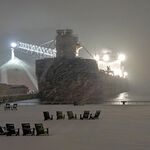afransen
Senior Member
Seems like NATO should try to at least specialize. Maybe we make everyone's APCs or something, and we buy our subs from people who actually know what they're doing and not the New Brunswick mob (aka the Irvings).
Seems like NATO should try to at least specialize. Maybe we make everyone's APCs or something, and we buy our subs from people who actually know what they're doing and not the New Brunswick mob (aka the Irvings).
It's important to remember that the process to build new warships domestically didn't really start in earnest (meaning the government of the day could no longer ignore the problem) until after existing hulls were found to be unseaworthy, and then fund the rebuilding of shipyards and skills that had been allowed to rot on the vine. It's a typical Canadian approach; keep equipment until long past obsolescence, experience a crisis which reveals a price tag a timeline that scares the pants off everybody. You can't maintain facilities and skills based on half-century cycles.I’m aware of the Type 26, my point above was to expedite as much as possible.
We would have to do it like the F-35 program, with baked-in industrial offsets. I really don't see a domestic program being started from scratch. Whatever the number, it wouldn't be large enough to develop, justify and sustain the necessary skills and facilities; and hoping to build something for other countries butts up against other nations wanting to do the same thing.It's not really possible. The whole point of the National Shipbuilding Strategy is to create a pipeline of shipbuilding. Moving up construction breaks the pipeline. There might be some room. But you gotta ask how worthwhile it is.
Zero chance we cut a $2B cheque for four subs with zero economic benefit to Canada. Which ever government signs that deal losses votes on both coasts + Quebec. Also, we need way more than 4 subs. So might as well stand up a program and do it right.

 nofighterjets.ca
nofighterjets.ca
Meh. Groups like this will always exist. Their not particularly against the F-35 purchase, they're against any military spending. They're a little off with their history of CF-18 deployment as well.And now these bozos….

HOME — No Fighter Jets
The campaign to stop Canada's planned warplane purchase. Canada does not need to buy fighter jets, and 2022 is our critical opportunity to stop this purchase before it happens. Join the #NoNewFighterJets campaign!nofighterjets.ca
Do they want the RCAF to follow the RNZAF and drop any fighter capability whatsoever?
And now these bozos….

HOME — No Fighter Jets
The campaign to stop Canada's planned warplane purchase. Canada does not need to buy fighter jets, and 2022 is our critical opportunity to stop this purchase before it happens. Join the #NoNewFighterJets campaign!nofighterjets.ca
Do they want the RCAF to follow the RNZAF and drop any fighter capability whatsoever?
Meh. Groups like this will always exist. Their not particularly against the F-35 purchase, they're against any military spending. They're a little off with their history of CF-18 deployment as well.
And I've never understood that. I can understand including any infrastructure costs necessary to support a purchase, but not full life cycle costs. We are either unique or in a small minority of countries that do that. To the best of my knowledge it doesn't follow normally accepted accounting principles if, for no other reason, it is impossible to base them on a credible estimating method.I will add that the cause of these groups is helped by the way we talk about defence spending in Canada. Military procurement in Canada is always announced with both system procurement and 20 yr support contracts. Costs are often discussed with 30 yr lifecycle estimates. Imagine we discussed healthcare, public transit, etc the same way. How many hospitals and subways would be build?
Haven't we started pricing transit projects that way, hence the $6B Hurontario LRT?I will add that the cause of these groups is helped by the way we talk about defence spending in Canada. Military procurement in Canada is always announced with both system procurement and 20 yr support contracts. Costs are often discussed with 30 yr lifecycle estimates. Imagine we discussed healthcare, public transit, etc the same way. How many hospitals and subways would be build?
Haven't we started pricing transit projects that way, hence the $6B Hurontario LRT?
We already have. The oldest of our fleet is 40 years old. They been through upgrades but we need to maintain a viable fleet until the F-35 becomes operational. The article says 2029.Ottawa has signed a contract for 88 F35 for $19B. I hear we're also buying some second hand f18s from Australia.
With the exception of whatever replaces the ancient CP-140 Auroras in the mid 2030s, the F-35 is probably the last manned fixed wing combat aircraft Canada will ever operate. By the 2080s when we retire the F-35 it will be all Skynet.Ottawa has signed a contract for 88 F35 for $19B. I hear we're also buying some second hand f18s from Australia.
I think there is going to be plenty of Skynet with the F35. I guess there are thoughts that 6th gen fighters will be bigger to support crews of two, with the second operator managing various unmanned platforms. One would think that it will be easier to make very stealthy unmanned ordinance carrying platforms.With the exception of whatever replaces the ancient CP-140 Auroras in the mid 2030s, the F-35 is probably the last manned fixed wing combat aircraft Canada will ever operate. By the 2080s when we retire the F-35 it will be all Skynet.




